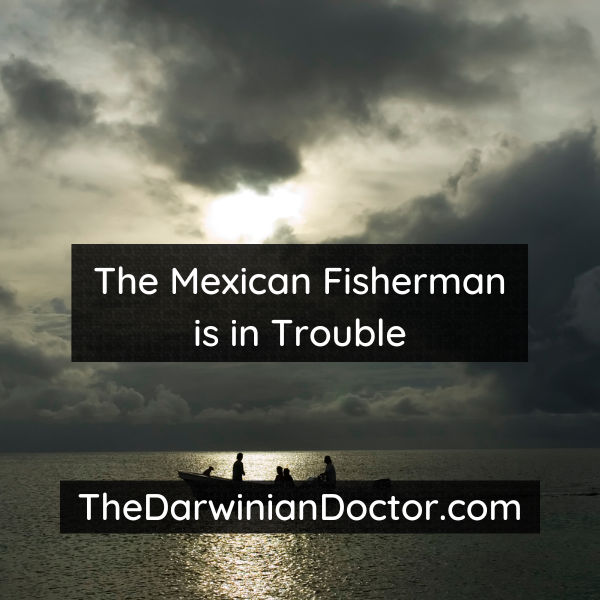In this post, I take another look at a modern day parable and come to a different conclusion: the Mexican fisherman is in trouble!

This post may contain affiliate links.
There’s a modern day parable that you might have read before about an investment banker and a Mexican fisherman, originally written by Heinrich Boll, a German writer. I’ve copied that parable below for you to review. The most common interpretation of this parable is that modern Americans are missing the proverbial boat chasing after the almighty dollar. That if we just stopped and considered what’s really important in life, we’d get off the hamster wheel. Perhaps we already have everything that we desire.
But the more I think about this parable, the more I worry about the Mexican fisherman. Take a look at the parable and then let’s discuss.
The story goes like this:
An American investment banker was taking a much-needed vacation in a small coastal Mexican village when a small boat with just one fisherman docked. The boat had several large, fresh fish in it.
The investment banker was impressed by the quality of the fish and asked the Mexican how long it took to catch them.
The Mexican replied, “Only a little while.”
The banker then asked why he didn’t stay out longer and catch more fish?
The Mexican fisherman replied he had enough to support his family’s immediate needs.
The American then asked: “But what do you do with the rest of your time?”
The Mexican fisherman replied: “I sleep late, fish a little, play with my children, take siesta with my wife, stroll into the village each evening where I sip wine and play guitar with my amigos: I have a full and busy life, señor.”
The investment banker scoffed: “I am an Ivy League MBA, and I could help you. You could spend more time fishing and with the proceeds buy a bigger boat, and with the proceeds from the bigger boat you could buy several boats until eventually, you would have a whole fleet of fishing boats. Instead of selling your catch to the middleman, you could sell directly to the processor, eventually opening your own cannery. You could control the product, processing and distribution.”
Then he added: “Of course, you would need to leave this small coastal fishing village and move to Mexico City where you would run your growing enterprise.”
The Mexican fisherman asked, “But señor, how long will this all take?”
To which the American replied: “15–20 years.”
“But what then?” asked the Mexican.
The American laughed and said,
“That’s the best part. When the time is right you would announce an IPO and sell your company stock to the public and become very rich. You could make millions.”
“Millions, señor? Then what?”
To which the investment banker replied: “Then you would retire. You could move to a small coastal fishing village where you would sleep late, fish a little, play with your kids, take siesta with your wife, stroll to the village in the evenings where you could sip wine and play your guitar with your amigos.”
Heinrich Boll: The Parable of the Mexican Fisherman and the Investment Banker
The common interpretation
As I mentioned above, the purpose of this parable is to teach Americans to stop chasing after the almighty dollar. Instead of striving for more profit and a big payday, perhaps we already have what we need, if we just would look around.
In the parable, despite not having a large fishing operation worth millions, the Mexican fisherman already seems to have an enviable life. Instead of working all day like most Americans, he prioritizes family, friends, and freedom.
Incidentally, this is exactly what I discussed as being my big motivator in this post: My Why: Family, Friends, and Freedom.
He is wise enough to know that if he spends his life years trying to build a huge fishing business, he’s missing the opportunity to enjoy the simple pleasures that he already has. In fact, it seems to be the fancy investment banker who is missing the big picture.
But does the fisherman really have the upper hand here?
One storm away from ruin
The more I think about this situation, the more it makes me uneasy. If we just play out this scenario, I think more about the future of the fisherman, and less about his present. I think about what happens to him living so close to subsistence level.
If a storm comes and washes away the dock and his fishing boat, how then will he enjoy his family, friends, and freedom? How is his emergency fund? How will he have time to sip wine and play guitar when he’s worrying about having food to eat?
Perhaps I’m being too cynical, and he actually has a carefully maintained stockpile of VTSAX index funds. But I don’t think so.
Note: I hope this doesn’t come across as critical of fisherman in general (or Mexicans). If it does, I’m very sorry — that’s not my intent.
Be optimistic yet paranoid
A lot of my approach to life and personal finance has to do with my financial past. As I’ve written before, my family struggled with money when I was young.
So much of what I do now is geared towards preventing a similar fate for my kids. Becoming a doctor (particularly as urologic surgeon) and investing in stocks and real estate has probably averted this possibility for my kids, but I still worry.
Indeed, in his famous book “The Psychology of Money,” Morgan Housel argues that it takes a special combination of optimism and paranoia to both gain and maintain wealth. (Gaining wealth and actually keeping it are two different things.)
So when it comes to the Mexican fisherman, my paranoid mind worries that he is wealthy in life satisfaction (for now), but he’s just one storm away from financial ruin.
Conclusion
So the Mexican fisherman is in trouble. He’s figured out some truths: that much of what we aim for we already have. But without careful preparation, all he has can be washed away by the next tropical storm.
We’re in a financial storm of sorts now. Economic headwinds, fueled by inflation and war, are gaining speed and threatening our collective futures. The Federal Reserve is using its hammer of interest rate hikes to try to bludgeon our economy back to a sustainable path, but there are going to be a lot of casualties from this approach.
So let’s try to learn from both sides of the parable here: realize that you might already have what are striving for, but take measures to protect the future you desire.
— The Darwinian Doctor
Enjoy this post? Subscribe below so you don’t miss another!
Want to support the blog?
- Join our investor club at Cereus Real Estate
- Visit my Recommendations page
- Check out my wife’s food blog: Eat Dessert First
- Stay at our luxury short term rentals
- Check out my TikTok channel
- Follow me on Instagram
- Follow me on YouTube
- Contact me with questions
Perhaps you’re more of a Facebook type?
Are you a physician, spouse, or professional and you’re interested in using Real Estate to gain financial freedom? Join us in our Facebook group and accelerate your journey!




7 comments
Daniel, Great insights about how many middle class live paycheck to paycheck.
But the rat race of trying to create wealth is also a big trap which is what i think the parable or story is trying to illustrate. Having lost millions in the market this year, it’s been difficult. a little bit of Mexican fisherman would have saved me some sanity and some millions too. Because in the pursuit of wealth – you get greedy (or at least I did) and that greed can lead to risky behavior (which I did). Even with millions leftover, the feeling of poverty after losing millions upon millions is not a small matter.
Lastly, I know a middle class person living in lower cost of living location, enjoying life and doing much of what most of us wealthier people do and still feeling satisfied.
Let’s say mexican fisherman with savings/retirement/401K (but not in the millions) maybe the best middle road possible.
Agree! A middle of the road approach is usually best, as it seems to be in this case as well! Sorry about the millions — it’ll come back!
the entire post is around this statement – “he actually has a carefully maintained stockpile of VTSAX index funds. But I don’t think so“
on the contrary, when I read the story the first time, it sounded to me that the fisherman already has a nest egg somewhere (not in the form of index funds, but whatever the local norm of investment) and that’s why he is content with catching little fish for the day… his contentment followed once his emergency fund was sorted 🙂
So I think it’s a matter of perspective on how the story is approached
You’re right — it depends on whether or not you think the fisherman has a nest egg or not. If he does, he’s really got it figured out!
Thanks for the comment!
I’m just starting to teach my nephew to fish…he loves it but he’s scared of the maggots!…any advice?
Keep those great blogs coming….
Thank you! Figurative maggots abound in the world. I think the best protection is having good common sense and mentorship. Keep on teaching!
Responding to comments really gives the sense of community to readers, it really shows them that you care about your readers and that your not some robot behind a keyboard.